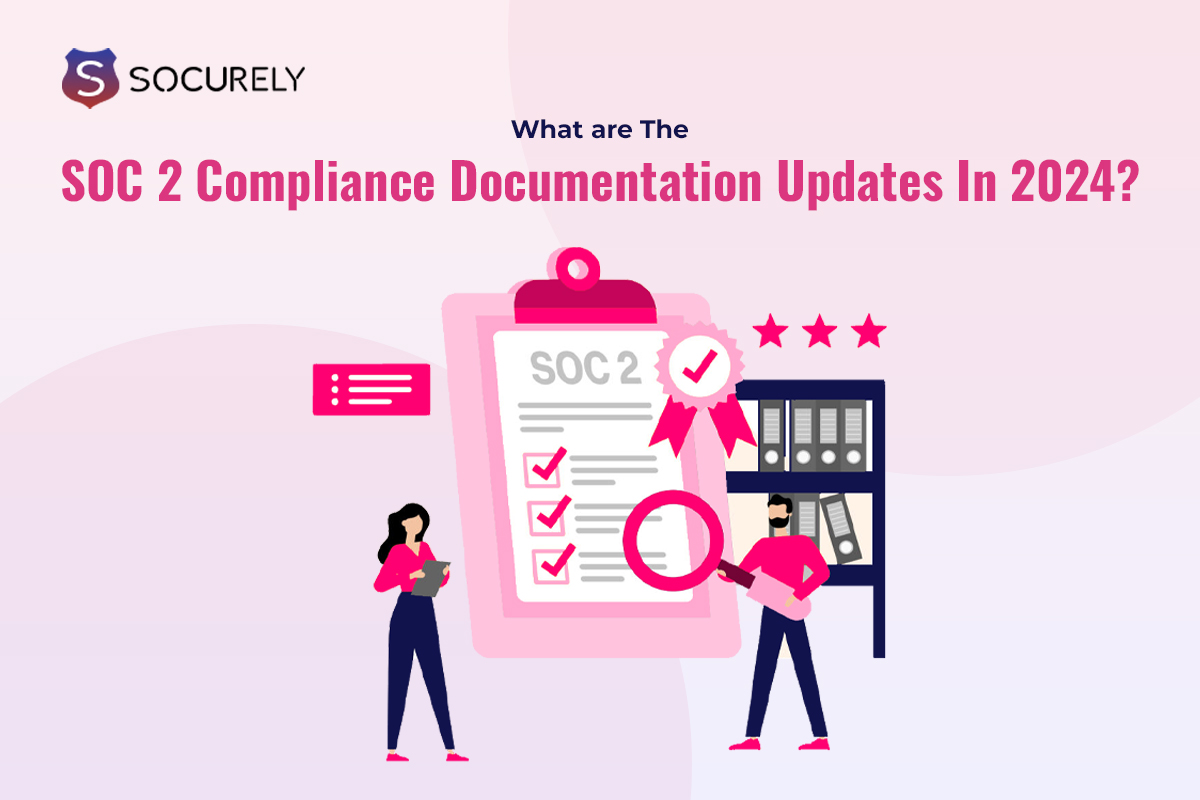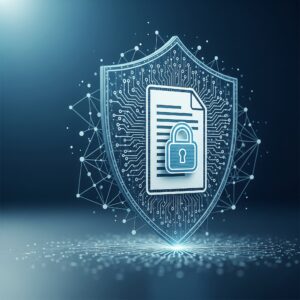Did you know that 60% of small businesses close within six months of experiencing a significant cyber attack? In an age where data breaches and cyber threats are becoming increasingly common, safeguarding your business with robust security frameworks is crucial. SOC 2 compliance is not just a checkbox for regulatory purposes; it’s a powerful framework that can protect your organization from costly security incidents.
Focusing on the importance of SOC 2, we already have talked about the compliance checklist of SOC 2, you can read it here- https://socurely.com/ensuring-soc-2-compliance-a-comprehensive-checklist/.
In this guide will walk you through everything you need to know about SOC 2 compliance documentation, including the latest updates for 2024 and how you can get started.
What Is SOC 2 Documentation?
The physical evidence of your adopted policies, practices, and other internal controls concerning the five SOC 2 Trust Services Criteria (TSC) is your SOC 2 documentation. It includes other collections of records, policies, procedures, and evidence that an organization must maintain to demonstrate compliance with the SOC 2 framework. The SOC 2 framework is designed to evaluate the effectiveness of an organization’s controls related to security, availability, processing integrity, confidentiality, and privacy of data. Proper documentation is crucial as it provides the foundation for the SOC 2 audit process, ensuring that an organization’s controls are not only in place but are also being followed consistently.
For instance, in your business, you need to maintain and collect evidence through logs, docs, screenshots, tickets, and paperwork.
** Note- If you need any guidance for SOC 2 Documentation then we are here with the valid resources. Check us now!
Keep in mind that SOC 2 is a framework that attributes the five TSCs (security, availability, processing integrity, confidentiality, and privacy) rather than a rigid set of standards. To get this standard, SOC 2 Documentation is needed. It proves that your company manages and safeguards client data by security best practices. You can show clients and business partners your unwavering dedication to responsible data management by finishing SOC 2 documentation. With this, you can build users’ trust that your business will handle their information responsibly by enabling third-party verification for IT systems and software development processes. Also, an organization’s ability to pass the audit with flying colors depends on having complete and up-to-date SOC 2 paperwork. Therefore, it’s never too early to organize your SOC 2 documentation.
Also, read the Type 1 and II OF SOC 2 Compliance, Here- https://socurely.com/demystifying-soc-2-compliance-unraveling-the-differences-between-type-i-and-type-ii/
Why SOC 2 Documentation Is Important?
Now that you know “What SOC 2 Documents” are, let’s understand its importance-
- Audit Readiness
Comprehensive SOC 2 documentation ensures that your organization is always prepared for an audit. It provides the necessary evidence that your controls are in place and functioning effectively, reducing the time and effort required to pass an audit.
- Risk Management
Detailed documentation helps in identifying and mitigating risks by providing a clear record of your security practices and controls. This allows for regular reviews and updates, ensuring that your security measures are always up to date.
- Customer Trust
Proper SOC 2 documentation shows that you have implemented robust controls to protect their data, building trust and confidence in your services.
- Regulatory Compliance
SOC 2 documentation helps ensure that your organization complies with these regulations, avoiding potential fines and legal issues.
- Operational Efficiency
Clear and well-maintained documentation streamlines your organization’s operations by providing a structured approach to security practices. This leads to more efficient processes and quicker response times in case of a security incident.
Also, read “Why SOC 2 Audits Are Crucial For Small Businesses?”
What Documentation Is Required For SOC 2 Compliance?
Depending on the TSC you wish to include in your audit, different documents will be needed for SOC 2.
SOC 2 Documentation as per TSC-
- Security
- Availability
- Processing Integrity
- Confidentiality
- Privacy
The TSC documents include-
- Security: To prevent unwanted access, provide an attestation of data protection measures.
- Availability: In this case, reasonable information on security measures that guarantee the service’s availability and the application of access controls must be included in the documentation.
- Processing integrity: All transactions must be authenticated by the documentation as being completed on time and correctly.
- Confidentiality: You have to demonstrate that all private or sensitive information is safeguarded in compliance with the security guidelines outlined in the service agreement for the company.
- Privacy: The records must demonstrate that the personal data is managed in compliance with the applicable privacy laws or guidelines that are outlined in the privacy notifications.
Also, apart from these, there are a few other documents that you must keep ready before the audit check-
- Security Policies and Procedures
These documents outline the organization’s security measures and protocols, including data encryption practices, access controls, and incident response procedures.
- Risk Assessment Reports
Regular risk assessments identify potential threats and vulnerabilities, and the corresponding reports detail how these risks are mitigated.
- Access Control Policies
These policies define how access to sensitive data is managed and restricted, ensuring only authorized personnel can access critical systems and information.
- Incident Response Plans
A detailed incident response plan outlines the steps to be taken in the event of a security breach, ensuring quick and effective action to minimize damage.
- Audit Logs
Comprehensive audit logs track all access and activities related to sensitive data, providing a trail of evidence that can be reviewed during audits.
- Employee Training Records
Documentation of regular security training sessions for employees, ensuring they are aware of best practices and potential threats.
- Vendor Management Policies
Policies and agreements related to third-party vendors to ensure they comply with the organization’s security standards.
- Business Continuity and Disaster Recovery Plans
Plans that ensure the organization can continue operations and recover data in the event of a disruption or disaster.
- System Monitoring and Maintenance Logs
Records of regular system monitoring and maintenance activities to ensure ongoing security and performance.
- Complementary User Entity Controls
SOC 2 Controls are also known as CUECs. These controls ensure that a report is complete and prevent it from causing inadequate or flawed audits from the business’s perspective.
What Are The 2024 Updates On SOC 2 Documentation?
As cyber threats continue to evolve, so do the requirements for SOC 2 compliance documentation.
- Enhanced Data Encryption Standards
With the rise of sophisticated cyber attacks, the 2024 updates emphasize stronger data encryption methods. Organizations must adopt Advanced Encryption Standard (AES) with a 256-bit key length for both data at rest and in transit.
- More Comprehensive Risk Assessments
Risk assessment processes must now include a more detailed analysis of emerging threats, such as ransomware and supply chain attacks. Organizations are required to document not only the risks but also their impact and likelihood, along with mitigation strategies.
- Stricter Access Control Measures
The updates mandate multi-factor authentication (MFA) for all access to sensitive systems and data. Documentation must include the implementation of MFA and regular reviews of access controls to ensure they remain effective.
- Incident Response and Recovery Enhancements
Incident response plans must now incorporate more granular steps for different types of incidents, including specific procedures for ransomware attacks. Documentation should detail the roles and responsibilities of each team member involved in incident response.
- Vendor Management and Third-Party Risk
Organizations must conduct more thorough due diligence on third-party vendors, including regular security assessments and contractual agreements that mandate compliance with SOC 2 requirements. Documentation should include vendor risk assessments and ongoing monitoring activities.
- Continuous Monitoring and Automated Reporting
The 2024 updates encourage the use of automated tools for continuous monitoring and real-time reporting of security incidents. Documentation should capture the deployment and configuration of these tools, along with regular reviews and updates.
Start Your SOC 2 Documentation With Socurely
Getting started with SOC 2 documentation can be daunting, but Socurely is here to help. Socurely offers comprehensive solutions to streamline the documentation process, ensuring your organization meets all SOC 2 requirements efficiently. Our platform provides:
- Template Libraries: Access to a wide range of customizable templates for all required SOC 2 documentation.
- Automated Workflows: Simplify the process of collecting and organizing documentation with automated workflows.
- Compliance Monitoring: Continuous monitoring of compliance status with real-time alerts and notifications.
- Expert Support: Access to compliance experts who can guide you through the documentation process and address any questions or concerns.
By partnering with Socurely, you can ensure that your SOC 2 documentation is thorough, accurate, and up-to-date, providing a solid foundation for a successful SOC 2 audit.
Conclusion
SOC 2 compliance is critical for organizations looking to demonstrate their commitment to cybersecurity and data protection. Proper documentation is the cornerstone of SOC 2 compliance, providing the evidence needed to pass an audit and maintain ongoing compliance. With the 2024 updates, organizations must enhance their documentation practices to address evolving threats and regulatory requirements. By leveraging the expertise and tools provided by Socurely, you can streamline the documentation process and achieve SOC 2 compliance with confidence.







